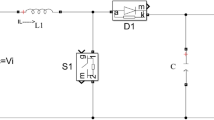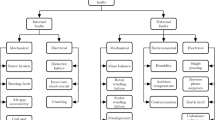Abstract
In this paper, a new adaptive control method is presented for a class of induction motors. The dynamics of the system are assumed to be unknown and also are perturbed by some disturbances such as variation of load torque and rotor resistance. A type-2 fuzzy system based on rough neural network (T2FRNN) is proposed to estimate uncertainties. The parameters of T2FRNN are adjusted based on the adaptation laws which are obtained from Lyaponuv stability analysis. The effects of the uncertainties and the approximation errors are compensated by the proposed control method. Simulation results verify the good performance of the proposed control method. Also a numerical comparison is provided to show the effectiveness of the proposed fuzzy system.



















Similar content being viewed by others
References
Ali JA, Hannan M, Mohamed A, Abdolrasol MG (2016) Fuzzy logic speed controller optimization approach for induction motor drive using backtracking search algorithm. Measurement 78:49–62
Amin F, Fahmi A, Abdullah S (2019) Dealer using a new trapezoidal cubic hesitant fuzzy TOPSIS method and application to group decision-making program. Soft Comput 23(14):5353–5366
Ammar A, Bourek A, Benakcha A (2017) Nonlinear svm-dtc for induction motor drive using input–output feedback linearization and high order sliding mode control. ISA Trans 67:428–442
Devi K, Gautam S, Nagaria D (2014) Speed control of 3-phase induction motor using self-tuning fuzzy PID controller and conventional PID controller. Int J Inf Comput Technol 4(12):1185–1193
Dong C, Brandstetter P, Vo HH, Tran TC, Vo DH (2016) Adaptive sliding mode controller for induction motor. In: International conference on advanced engineering theory and applications. Springer, New York, pp 543–553
Erbatur K, Çallı B (2009) Fuzzy boundary layer tuning for sliding mode systems as applied to the control of a direct drive robot. Soft Comput 13(11):1099
Fahmi A, Abdullah S, Amin F, Khan MSA (2019) Trapezoidal cubic fuzzy number Einstein hybrid weighted averaging operators and its application to decision making. Soft Comput 23(14):5753–5783
Fekih A (2008) Effective fault tolerant control design for nonlinear systems: application to a class of motor control system. IET Control Theory Appl 2(9):762–772
Hagras HA (2004) A hierarchical type-2 fuzzy logic control architecture for autonomous mobile robots. IEEE Trans Fuzzy Syst 12(4):524–539
Hamidzadeh J, Zabihimayvan M, Sadeghi R (2018) Detection of web site visitors based on fuzzy rough sets. Soft Comput 22(7):2175–2188
Hosein SM, Ardashir M (2019) A new robust control for induction motors. IETE J Res. https://doi.org/10.1080/03772063.2019.1643265
Huang S, Chen M (2016) Constructing optimized interval type-2 TSK neuro-fuzzy systems with noise reduction property by quantum inspired BFA. Neurocomputing 173:1839–1850
Jain S, Thakur A (2017) Closed loop speed control of induction motor fed by a high performance z-source inverter. Imp J Interdiscip Res 3(2):47–51
Kusagur A, Fakirappa Kodad S, Ram S (2012) Modelling & simulation of an anfis controller for an ac drive. World J Model Simul 8(1):36–49
Li J, Ren H-P, Zhong Y-R (2015) Robust speed control of induction motor drives using first-order auto-disturbance rejection controllers. IEEE Trans Ind Appl 51(1):712–720
Lin C-M, Le T-L (2017) Pso-self-organizing interval type-2 fuzzy neural network for antilock braking systems. Int J Fuzzy Syst 19(5):1362–1374
Lin Y-Y, Chang J-Y, Lin C-T (2014) A tsk-type-based self-evolving compensatory interval type-2 fuzzy neural network (TSCIT2FNN) and its applications. IEEE Trans Ind Electron 61(1):447–459
Lin C-M, Le T-L, Huynh T-T (2018) Self-evolving function-link interval type-2 fuzzy neural network for nonlinear system identification and control. Neurocomputing 275:2239–2250
Malwiya R, Rai V (2015) Optimum tuning of PI controller parameter for speed control of induction motor. Int J Adv Technol Eng Res 5:21–24
Masumpoor S, Khanesar MA et al (2015) Adaptive sliding-mode type-2 neuro-fuzzy control of an induction motor. Expert Syst Appl 42(19):6635–6647
Mendel JM, John RI, Liu F (2006) Interval type-2 fuzzy logic systems made simple. IEEE Trans Fuzzy Syst 14(6):808–821
Miloudi A, Al-Radadi EA, DRAOU A (2007) A variable gain PI controller used for speed control of a direct torque neuro fuzzy controlled induction machine drive. Turk J Electr Eng Comput Sci 15(1):37–49
Mohammadzadeh A, Ghaemi S (2017) Synchronization of uncertain fractional-order hyperchaotic systems by using a new self-evolving non-singleton type-2 fuzzy neural network and its application to secure communication. Nonlinear Dyn 88(1):1–19
Mohammadzadeh A, Ghaemi S, Kaynak O, Khanmohammadi S (2016) Robust \(h_\infty \)-based synchronization of the fractional-order chaotic systems by using new self-evolving nonsingleton type-2 fuzzy neural networks. IEEE Trans Fuzzy Syst 24(6):1544–1554
Mohammadzadeh A, Sabzalian MH, Zhang W (2019) An interval type-3 fuzzy system and a new online fractional-order learning algorithm: theory and practice. IEEE Trans Fuzzy Syst. https://doi.org/10.1109/TFUZZ.2019.2928509
Nie M, Tan WW (2008) Towards an efficient type-reduction method for interval type-2 fuzzy logic systems. In: IEEE international conference on fuzzy systems. FUZZ-IEEE 2008. (IEEE world congress on computational intelligence). IEEE, 2008, pp. 1425–1432
Pal A, Das S, Chattopadhyay AK (2017) An improved rotor flux space vector based MRAS for field oriented control of induction motor drives. IEEE Trans Power Electron 33(6):5131–5141
Sabzalian MH, Mohammadzadeh A, Lin S, Zhang W (2019) New approach to control the induction motors based on immersion and invariance technique. IET Control Theory Appl 13(10):1466–1472
Saghafinia A, Ping HW, Uddin MN (2014) Fuzzy sliding mode control based on boundary layer theory for chattering-free and robust induction motor drive. Int J Adv Manuf Technol 71(1–4):57–68
Tao C-W, Taur J-S (2007) Parallel distributed fuzzy sliding mode control for nonlinear mismatched uncertain systems. Soft Comput 11(7):607–616
Topaloglu M, Yarkin F, Kaya T (2018) Solid waste collection system selection for smart cities based on a type-2 fuzzy multi-criteria decision technique. Soft Comput 22:4879–4890
Vahedi M, Hadad Zarif M, Akbarzadeh Kalat A (2015) Speed control of induction motors using neuro-fuzzy dynamic sliding mode control. J Intell Fuzzy Syst 29(1):365–376
Vahedi M, Hadad Zarif M, Akbarzadeh Kalat A (2016) An indirect adaptive neuro-fuzzy speed control of induction motors. J AI Data Min 4(2):243–251
Yousef H, Hamdy M, El-Madbouly E, Eteim D (2009) Adaptive fuzzy decentralized control for interconnected mimo nonlinear subsystems. Automatica 45(2):456–462
Zhang T, Liu D, Yue D (2017) Rough neuron based rbf neural networks for short-term load forecasting. In: IEEE international conference on energy internet (ICEI). IEEE, pp 291–295
Acknowledgements
This paper is partly supported by the National Science Foundation of China (61473183, U1509211, 61627810), and National Key R&D Program of China (2017YFE0128500).
Author information
Authors and Affiliations
Corresponding author
Ethics declarations
Conflict of Interest
The authors declare that they have no conflict of interest.
Ethical approval
This article does not contain any studies with human participants or animals performed by any of the authors.
Additional information
Communicated by V. Loia.
Publisher's Note
Springer Nature remains neutral with regard to jurisdictional claims in published maps and institutional affiliations.
Rights and permissions
About this article
Cite this article
Sabzalian, M.H., Mohammadzadeh, A., Lin, S. et al. A robust control of a class of induction motors using rough type-2 fuzzy neural networks. Soft Comput 24, 9809–9819 (2020). https://doi.org/10.1007/s00500-019-04493-3
Published:
Issue Date:
DOI: https://doi.org/10.1007/s00500-019-04493-3




